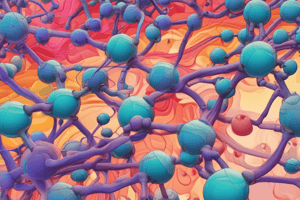Podcast
Questions and Answers
What type of polypropylene has all methyl groups arranged on the same side of the polymer chain?
What type of polypropylene has all methyl groups arranged on the same side of the polymer chain?
- Isotactic polypropylene (correct)
- Atactic polypropylene
- Syndiotactic polypropylene
- Copolymer polypropylene
Which type of resin softens upon heating and hardens upon cooling?
Which type of resin softens upon heating and hardens upon cooling?
- Thermoplastic resins (correct)
- Composite resins
- Thermosetting resins
- Elastomers
What describes the process of copolymerization?
What describes the process of copolymerization?
- Polymerization resulting in ethylene
- Polymerization that requires high temperature
- Single monomer polymerization
- Joint polymerization of two or more monomers (correct)
What is a characteristic of thermosetting resins?
What is a characteristic of thermosetting resins?
What is typically eliminated during condensation polymerization?
What is typically eliminated during condensation polymerization?
Which polymerization process results in the production of styrene butadiene rubber (SBR)?
Which polymerization process results in the production of styrene butadiene rubber (SBR)?
What is meant by the degree of polymerization?
What is meant by the degree of polymerization?
What makes thermoplastic resins unsuitable for high-temperature applications?
What makes thermoplastic resins unsuitable for high-temperature applications?
What is a common method of termination in free radical polymerization?
What is a common method of termination in free radical polymerization?
What distinguishes ionic polymerization from free radical polymerization?
What distinguishes ionic polymerization from free radical polymerization?
What key discovery did Ziegler and Natta contribute to the field of polymer chemistry?
What key discovery did Ziegler and Natta contribute to the field of polymer chemistry?
Which type of polymer has all substituent groups arranged on one side of the polymeric backbone?
Which type of polymer has all substituent groups arranged on one side of the polymeric backbone?
What term describes the arrangement of Y groups in atactic polymers?
What term describes the arrangement of Y groups in atactic polymers?
What is the effect of Ziegler-Natta catalysts on olefin polymerization?
What is the effect of Ziegler-Natta catalysts on olefin polymerization?
What type of polymerization involves the collision of a growing chain with impurities as a termination method?
What type of polymerization involves the collision of a growing chain with impurities as a termination method?
Which of the following best describes syndiotactic polymers?
Which of the following best describes syndiotactic polymers?
What does the prefix 'poly' refer to in the context of polymers?
What does the prefix 'poly' refer to in the context of polymers?
Which of the following statements best describes a monomer?
Which of the following statements best describes a monomer?
Which type of polymerization does not involve the release of small molecules?
Which type of polymerization does not involve the release of small molecules?
In addition polymerization, what happens during the initiation phase?
In addition polymerization, what happens during the initiation phase?
What is the role of catalysts in the polymerization process?
What is the role of catalysts in the polymerization process?
Which of the following best describes the result of addition polymerization?
Which of the following best describes the result of addition polymerization?
What are the main factors that can be adjusted to modify polymers?
What are the main factors that can be adjusted to modify polymers?
Which mechanism of addition polymerization involves the reaction of a radical with its own monomer?
Which mechanism of addition polymerization involves the reaction of a radical with its own monomer?
Study Notes
Polymers
- Polymers are large molecules made up of smaller units called monomers.
- Polymerization is the process of combining these monomers to create a polymer chain.
- Polymers are found in various applications, including plastics.
Types of Polymerization
- Addition Polymerization - Monomers with double or triple bonds join, no small molecules are released.
- Free-radical polymerization - Involves initiation, propagation, and termination stages.
- Initiation: An initiator decomposes into free radicals, which react with monomers.
- Propagation: The free radical reacts with another monomer, forming a chain.
- Termination: The growing chains react with each other or with impurities.
- Ionic polymerization: Similar to free-radical polymerization, but uses cations or anions as intermediates.
- Coordination or Ziegler-Natta polymerization: Uses specific catalysts to control the polymer's structure.
- Stereospecific polymerization: This polymerization process creates polymers with specific arrangements of monomers in the chain. Examples include isotactic, syndiotactic, and atactic polymers.
- Free-radical polymerization - Involves initiation, propagation, and termination stages.
- Condensation Polymerization: Monomers join with the release of smaller molecules like water, forming polymers.
- Nylon (polyamide): Forms a long chain with alternating amine and carboxylic acid groups.
- Polyester (Dacron): Forms a long chain with alternating ester groups.
- Copolymerization: Two or more different monomers are polymerized together, creating a copolymer.
Plastics (Resins)
- Plastics are high polymers that mold into different shapes using heat and pressure.
- Plastics are classified as either thermoplastic or thermosetting, depending on their behavior with heat.
- Thermoplastics: Soften when heated and harden when cooled, this change is reversible.
- Can be melted and reshaped repeatedly.
- Not suitable for high-temperature applications.
- Thermosetting plastics: Set permanently after initial heating and cannot be reshaped.
- Offer strong and durable properties compared to thermoplastics.
Degree of Polymerization
- The number of repeating units or monomers in a polymer chain
Studying That Suits You
Use AI to generate personalized quizzes and flashcards to suit your learning preferences.
Related Documents
Description
This quiz covers the fundamental concepts of polymers and their types of polymerization. Explore the processes of addition polymerization, free-radical polymerization, ionic polymerization, and coordination polymerization. Test your knowledge on how these processes contribute to the creation of polymers used in various applications.





